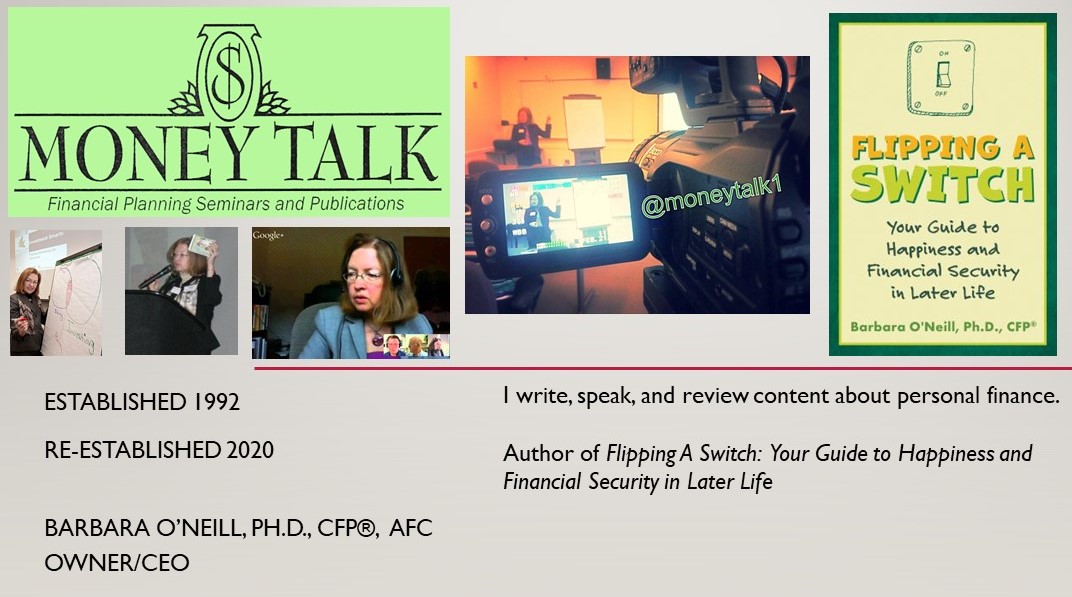As noted in last week's post, I am creating a new Money After 70 course for older adults. Below are 10 more changes, opportunities, and challenges for septuagenarians (people aged 70 to 79):
Lasts and ROLE
Calculations- As
people age, their time orientation changes. As I wrote in my book, Flipping a Switch, people start doing return on life expectancy
(ROLE) calculations. In other words, “mental math” comparing how long things
might last in relation to their age and life expectancy and whether certain
expenses (e.g., an expensive dental crown) are “worth it.”
Spending
Down- Another topic in Flipping
a Switch is switching from a saver to a spender in later life. A difficult
challenge for “super savers” is spending down accumulated wealth and seeing
account balances decrease as withdrawals are made for taxes on RMDs and health
care.
Increased
Risk of Diminished Capacity- The risk
of mild cognitive impairment (MCI) or dementia increases with age and accelerates rapidly in the mid-70s. By age 82, the chance of MCI or
dementia is over 50%. Therefore, a thorough estate planning review is
warranted.
Shortened
Investment Time Horizon- There is
a frequently cited “100-age formula” for the percentage of stocks in someone’s
portfolio, as well as 110-age (higher risk tolerance) and 120-age (aggressive
risk tolerance). With each one, stocks are half or less of 70+ year olds’
portfolio to reflect the fact that they don’t have much time for market “bounce
backs” to replenish losses.
New
Housing Considerations- Throughout
their 70s as life events (e.g., health issues, income loss, widowhood) occur, some
people may reconsider where they live and explore options such as a reverse
mortgage, continuing care retirement community (CCRC), and living with family.
RMD
Withdrawal Increases- As a taxpayer’s age increases, the percentage of their tax-deferred account balance that must be withdrawn
increases. At age 73, the RMD divisor of 26.5 is 3.78% of an account
balance and at age 79, it is 21.1 (4.74%). At ages 80, 90, and 100, the taxable
account withdrawal percentages increase to 4.96%, 8.20%, and 15.63%,
respectively.
Communication With Loved Ones- Many people put off conversations about “hard topics” (e.g., dying,
feeding tubes, care-giving expectations, bequests in a will) for decades. One’s
70s are the time to open up with family members and personal representatives
(e.g., executor). Current U.S. life expectancy is 79.11, although it averages in the mid 80s
for those at age 70.
Long-Term Care (LTC) Planning- At age 70+, LTC insurance is prohibitively expensive or may be
unavailable due to health issues. As a result, many 70-year olds address LTC
needs “on the fly” with strategies such as self-insurance, selling assets, moving,
and Medicaid divorces.
Simplification and Downsizing- An eighth decade of life increases the urgency to do this. Strategies noted
in Flipping a Switch include creating a financial inventory, closing
subpar accounts, consolidating “like” assets (e.g., IRAs), and shredding
unnecessary documents.
Getting Help- Even the most dedicated “do it yourselfers” may need help in their 70s due to inexperience or physical challenges. Examples include tax preparation after RMDs start, financial planning, legal assistance, house cleaning, lawn mowing, and in-home care.
This post provides
general personal finance or consumer decision-making information and does not
address all the variables that apply to an individual’s unique situation. It does
not endorse specific products or services and should not be construed as legal
or financial advice. If professional assistance is required, the services of a
competent professional should be sought.






No comments:
Post a Comment